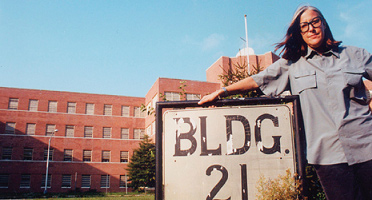Media/ArtsLooking Inside Public Mental Health Care
A documentary feature, Kings Park offers an inside look at public mental health care in America by focusing on the story of this now abandoned institution. The journey back begins with Lucy’s sudden decision, on the cusp of her 50th birthday, to return to Kings Park for the first time in over 30 years. Determined to face her past and come to terms with her commitment to the state hospital, Lucy’s goals are purely personal when the film begins. She soon learns, however, that in order to fully understand her own story, she needs to somehow learn about the institutional world in which she was once locked away. To this end, Lucy seeks out other former patients, their families, and hospital staff, who share intimate accounts of life at Kings Park. Shot on the overgrown and sprawling grounds of the shuttered hospital, these firsthand accounts of a vanishing world bear witness to the many changes in treatment, policy, and attitudes over the past century. The film culminates with a vision of today. Stories are shared of the often brutally executed “emptying out” of the hospital, and we follow Lucy in her effort to see how mental health care has changed since the hospital’s close. Scenes shot at small mental health care centers, committed to the recovery of their members despite limited resources, let us see the kind of progress that is being made. In contrast, footage shot at the local jail reveals a very different reality—where the penal system has replaced the state hospital as the default “provider” for people with serious mental illness. A documentary with great relevance for today, Kings Park brings to light our nation’s current crisis in mental health care and helps us to understand how we got here. Revealing the lessons of the past as a means of generating open discourse, Kings Park offers a creative platform from which we can face the challenges of the present and imagine the possibilities of the future. — Source: KingsParkMovie.com |

 They were very much alike—forbidding buildings and massive brick complexes—out of ear shot and hidden from view. These are the state hospitals where individuals deemed “mentally ill” were compelled to live out their lives. Established in 1885 and closed in 1996, Kings Park State Hospital on Long Island, New York, warehoused over 9,000 patients at its height in the 1950s. One such patient was Lucy Winer, the film’s director, committed there in 1967 as a suicidal teenage girl.
They were very much alike—forbidding buildings and massive brick complexes—out of ear shot and hidden from view. These are the state hospitals where individuals deemed “mentally ill” were compelled to live out their lives. Established in 1885 and closed in 1996, Kings Park State Hospital on Long Island, New York, warehoused over 9,000 patients at its height in the 1950s. One such patient was Lucy Winer, the film’s director, committed there in 1967 as a suicidal teenage girl.